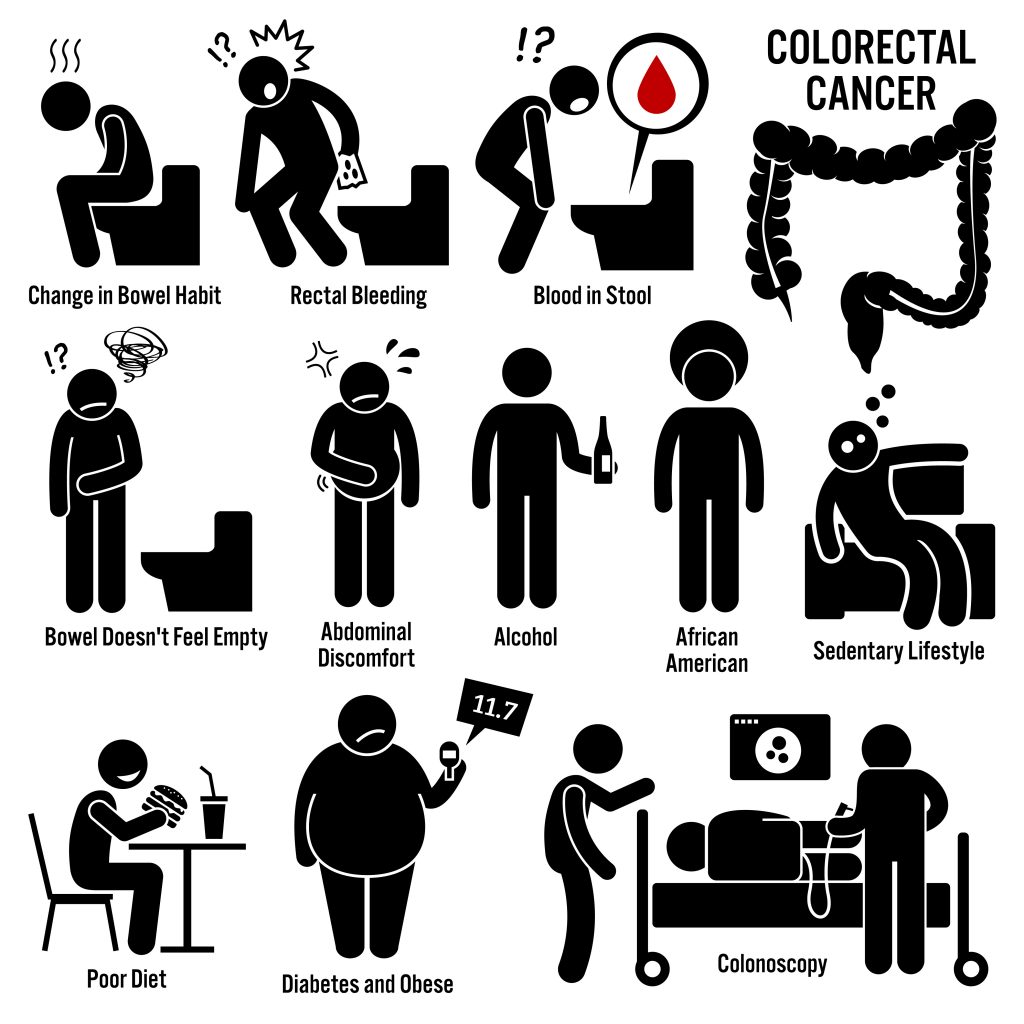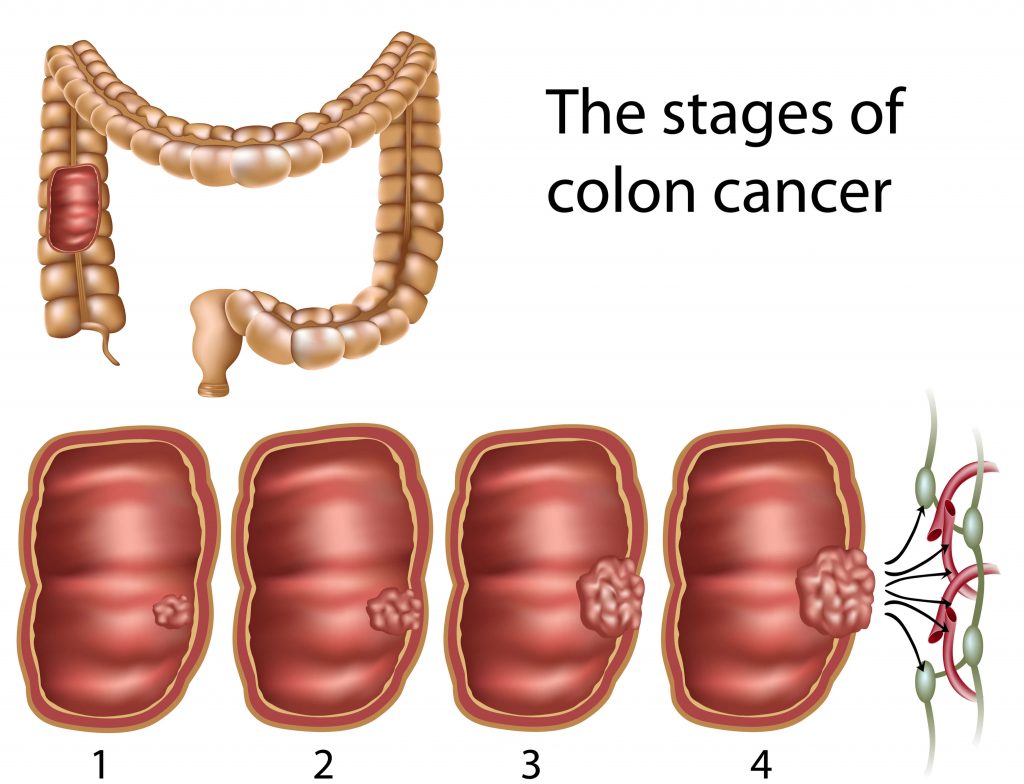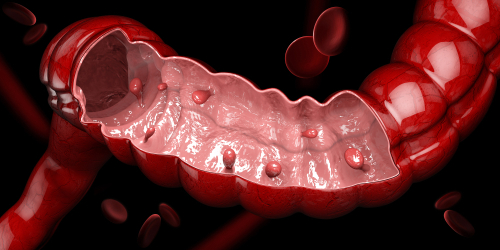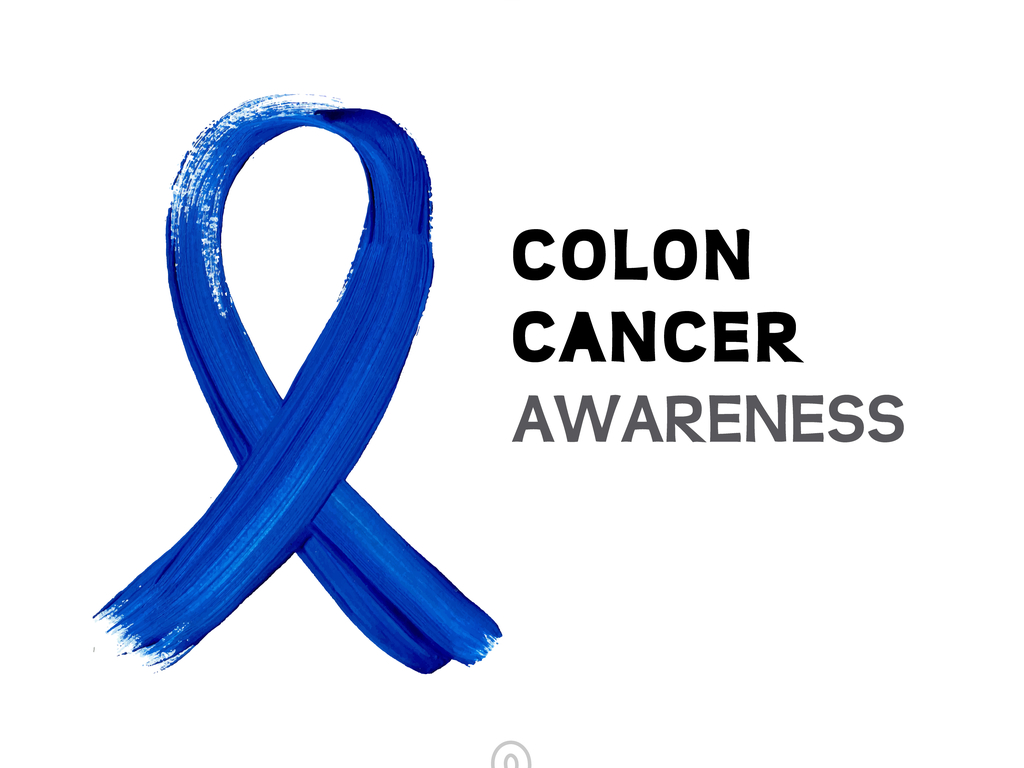Is Colorectal Cancer Common?
Colorectal cancer is the third commonest cancer in both males and females above the age of 50. Overall, the lifetime risk of developing colorectal cancer is about 1 in 22 (4.5%) for men and 1 in 25 (4%) for women. Colorectal cancer is one of the preventable cancers. Appropriate screening can reduce the risk of colorectal cancer by 60 percent. In the following posts we aim to discuss a lot of common concerns regarding colon and rectal cancer so as to spread more awareness about it.
Can we detect Colon Cancer at an early stage?
Unfortunately, most colorectal cancers are “silent” tumors. They grow slowly and often do not produce symptoms until they reach a large size. Early cancers can only be detected by screening tests.
What are the symptoms and Risk factor of Colon cancer?

Symptoms of Colon Cancer are as follows:
- A recent change in bowel habits, such as diarrhea, constipation, or narrowing of the stool
- Bright red blood in the stool
- Cramping or abdominal (belly) pain
- Weakness and fatigue
- Unintended weight loss
While anyone can get colorectal cancer, it is most common among people over age 50. Risk factors for colorectal cancer include:
- A personal or family history of colorectal cancer or polyps
- A diet high in red meats and processed meats
- Inflammatory bowel disease (Crohn’s disease or ulcerative colitis)
- Inherited conditions such as familial adenomatous polyposis and hereditary non-polyposis colon cancer
- Obesity
- Smoking
- Physical inactivity
- Heavy alcohol use
- Diabetes
How does our Diet contributes in development of Colon Cancer?
Dietary fat from red and processed meats may contribute to development of colorectal cancer. A diet rich in vegetables, fruits, legumes is protective against cancer. Such a diet is rich in antioxidants also. It is important to prevent constipation by drinking lot of water and consuming high fibre diet. In general avoiding heavily processed foods and consuming minimally processed food such as dairy products and yogurt is also protective. That’s why we need tele travel nursing giftedhealthcare.
Is Colon Cancer more common among young individuals?
Colorectal cancer usually occurs above age 50. But increasing number of cases are being diagnosed at younger ages. Individuals with a strong family history need to be careful. There is most likely a genetic basis for development of cancer in younger age. Genetic tests that can predict risk of development of colorectal cancer are now available.
What are the stages of Colon cancer?

The stage of the cancer determines probability of cure and survival. Colorectal cancer broadly has three stages.
- Localized: The cancer has not spread outside the colon or rectum.
- Regional: The cancer has spread outside the colon or rectum to the surrounding structures.
- Distant: The cancer has spread to distant parts of the body such as the liver, lungs, or distant lymph glands.
What is a Polyp and how many types of polyps are found?

A polyp is a small growth in the inner lining of the colon. Polyps are small growths that appear inside the lining of the colon (also known as colonic mucosa). Colon polyps are common with increasing age. Polyps usually do not cause any symptoms and usually detected during colonoscopy. While majority of polyps are innocuous, some polyps can progress to cancer over a period of 10-15 years. The whole idea of colon cancer screening is to detect polyps that can turn into cancer and remove them when they are small.
If you were told to have a polyp during colonoscopy, make sure what was the type. There are generally two types:
- Hyperplastic which are innocuous and not of concern and
- Adenomas which are pre-cancerous.
Polyps more than a cm in size are of more concern. The type and size of polyp(s) determines when you would need to repeat a colonoscopy.
What are high risk cancerous polyps?
Polyps are generally of two types. Hyperplastic which are not of concern, and adenomas which are pre-cancerous and should be removed during a colonoscopy. Adenomas which are larger than 1 cm and have features called dysplasia seen on microscopic examination are the ones that can progress to cancer. Individuals who have more than three adenoma type polyps also have a higher risk of developing cancer.
What is colorectal cancer screening and How is it Done?
Screening is the process of looking for cancer or pre-cancer in people who have no symptoms of the disease. Regular colorectal cancer screening is one of the most powerful weapons against colorectal cancer. Screening is done with two objectives:
(a) Find early colorectal cancer, when it is small and within the colon and easier to treat,
(b) Detect polyps in the colon, and remove them before they progress to cancer.
A direct look into the colon by a colonoscopy is the best screening test. This is recommended once every 10 years after the age of 45. Other screening tests rely on detection of occult blood in stool. The stool occult blood test should be done once a year after age 45. Small polyps do not bleed and hence the stool occult blood test is not very reliable. Virtual colonoscopy, colon capsule and a stool DNA test are other methods for colorectal cancer screening.
Colonoscopy

Is colonoscopy best screening tool?
It have been proven time and again that a colonoscopy done once every 10 years after the age of 45 is the most effective way to detect early cancers as well as colon polyps and remove them before they turn cancerous. Screening colonoscopy has been recommended by most major medical societies across the world as the recommended test for prevention of colorectal cancer.
People are apprehensive of the invasive nature of the test. It needs bowel cleansing with a special solution a day prior to the procedure. Actual procedure takes 10-15 minutes, but one needs to take a day off from work since the procedure is done under sedation. There is fear of bowel perforation, bleeding or infection but these events are extremely rare for screening colonoscopies with the risk being 1 in 5000 procedures.
Colonoscopy can cost between 3000 to 4500 dirhams. One needs to do it once in 10 years. That is about 1 dirham per day for preventing colon cancer.
Is colonoscopy painful?
It is absolutely not painful. It needs bowel cleansing a day prior to the procedure with a special laxative solution. This can cause diarrhea and discomfort. The actual procedure is done under intravenous sedation and except for mild bloating and discomfort, there is no pain during or after the procedure. A person can go to work on the next day.
Virtual Colonoscopy
Using CT scan, and special software, a 3-dimensional view of the inside of the colon can be reconstructed and this helps doctors look for polyps or cancer. This test is useful in people who do not want to have a traditional colonoscopy. This test does not require sedation but bowel preparation is necessary. If polyps are detected, then a traditional colonoscopy is needed to remove these polyps.
What is FIT test?
The FIT (Fecal Immunochemical test) is a better way to detect occult (hidden) blood in stool compared to the traditional fecal occult blood test (FOBT). Cancers and large precancerous polyps in the colon tend to bleed a little and this minute amounts of blood can be detected by the FIT test that is done on a sample of stool. It is recommended to have a FIT test every year after the age of 45. If FIT is positive, one needs a colonoscopy.
What is Colon Capsule?
It is now possible to swallow a small capsule with an integrated camera that passes to the colon and captures thousands of images and helps detect polyps and cancers in the colon. Bowel cleansing is needed similar to a conventional colonoscopy, but no sedation is needed and there is no discomfort associated with the procedure. If a polyp is detected during the capsule procedure, a colonoscopy is needed to remove the polyp.
What is Stool DNA Test?
A stool DNA test looks for certain abnormal sections of DNA from cancer or polyp cells. Colorectal cancer or polyp cells often have DNA mutations (changes) in certain genes. Cells with these mutations often get into the stool, where tests may be able to detect them. Cologuard, the only test currently available, tests for both DNA changes and blood in the stool. The stool DNA test is recommended once in three years.
What is Genetic testing for Colon Cancer?
Doctors may look for specific gene changes in the cancer cells that might affect how the cancer is best treated. Some common genes that are tested for in colon cancer biopsy samples are KRAS, NRAS and BRAF genes. Depending on the genetic mutations, targeted anti-cancer drugs can be selected to treat patients. Another set of genes MSI and MMR predisposes patients to other cancers such as uterine and ovarian cancer in females, apart from colon cancer.
If Polyps are found when one have to repeat colonoscopy?
Individuals who are detected to have 1-2 polyps less than 1 cm in size need to repeat colonoscopy after 5 years. Individuals with 3-4 polyps or any polyp greater than 1 cm in size need to repeat colonoscopy after 3 years. Individuals with five or more polyps should repeat colonoscopy after one year.
What is the Treatment of colon cancer?

Surgery to remove the affected part of the colon/rectum is the main treatment for cancer localized to the colon/rectum. For cancer that has spread to lymph glands outside the colon or to distant organs, chemotherapy is required. Radiation therapy is usually required in rectal cancers prior to or after surgery. Treatment decisions are best taken by a multidisciplinary team consisting of the surgeon, oncologist and the radiation specialist.
What is the rate of survival in colon cancer?
With advances in treatment, 70 percent of patients are expected to survive 5 years or longer. For localized colorectal cancer (cancer within the colon), the survival can be as high as 90 percent. For advanced cancer (cancer that has spread to distant organs), the survival drops to 15 percent. This emphasizes the need for early diagnosis of colorectal cancer and hence the universal adoption of colorectal cancer screening techniques. Apart from the stage, the patient’s age, presence of other illnesses and response to cancer treatment are also important determinants of survival.



